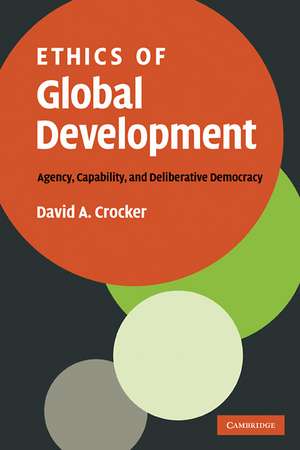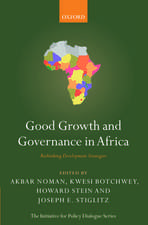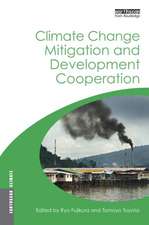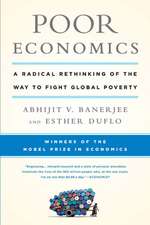Ethics of Global Development: Agency, Capability, and Deliberative Democracy
Autor David A. Crockeren Limba Engleză Paperback – 12 iul 2009
| Toate formatele și edițiile | Preț | Express |
|---|---|---|
| Paperback (1) | 427.05 lei 6-8 săpt. | |
| Cambridge University Press – 12 iul 2009 | 427.05 lei 6-8 săpt. | |
| Hardback (1) | 789.43 lei 6-8 săpt. | |
| Cambridge University Press – 9 iul 2008 | 789.43 lei 6-8 săpt. |
Preț: 427.05 lei
Nou
Puncte Express: 641
Preț estimativ în valută:
81.72€ • 85.15$ • 67.66£
81.72€ • 85.15$ • 67.66£
Carte tipărită la comandă
Livrare economică 03-17 aprilie
Preluare comenzi: 021 569.72.76
Specificații
ISBN-13: 9780521117388
ISBN-10: 0521117380
Pagini: 432
Ilustrații: 2 b/w illus.
Dimensiuni: 152 x 229 x 24 mm
Greutate: 0.63 kg
Editura: Cambridge University Press
Colecția Cambridge University Press
Locul publicării:Cambridge, United Kingdom
ISBN-10: 0521117380
Pagini: 432
Ilustrații: 2 b/w illus.
Dimensiuni: 152 x 229 x 24 mm
Greutate: 0.63 kg
Editura: Cambridge University Press
Colecția Cambridge University Press
Locul publicării:Cambridge, United Kingdom
Cuprins
List of figures; Preface; Acknowledgements; 1. Introduction; Part I. Development Ethics: 2. Agreements, controversies and challenges; 3. Ethics and development theory-practice; Part II. The Capability Approach: Ethical Foundations: 4. Critique of alternatives; 5. Agency, functioning and capability; 6. Evaluating capabilities an functionings; Part III. Strengthening and Applying the Capability Approach: 7. Agency, responsibility and consumption; 8. Hunger, capability and agency-oriented development; Part IV. Deliberative Democracy, Participation and Globalization: 9. The capability approach and deliberative democracy; 10. Deliberative participation and local development; 11. Development ethics, democracy and globalization; Index of names; Index of subjects.
Recenzii
'David Crocker's book opens up, in the most consistent manner, an area only imperfectly explored so far: the ethics of global development. It discusses whether there are duties of rich countries and individuals toward the poor. What is global justice? How fair is the existing trade system? What is the place of migration? As the world becomes more interdependent, these questions, generally discussed within the confines of the nation-state, will have to be addressed at a global level. David's book is a big step in that direction.' Branko Milanovic, World Bank and Carnegie Endowment, Washington
'The inclusion of second-generation rights makes it possible to integrate ethical issues underlying general ideas of global development with the demands of deliberative democracy, both of which connect with human rights and quite often with an understanding of the importance of advancing human capabilities. In his far-reaching contribution to this integration in Ethics of Global Development: Agency, Capability and Deliberative Democracy, David Crocker points out that because agency and valuable capabilities are 'the basis for human rights, social justice, and both individual and collective duties', a development ethic will also examine how a globalized world is a help or a hindrance as individuals and institutions fulfil their moral obligation to respect rights. He goes on to argue that 'the long-term goal of good and just development - whether national or global - must be to secure an adequate level of agency and morally basic capabilities for everyone in the world - regardless of nationality, ethnicity, religion, age, gender, or sexual preference.' It is only with the inclusion of second-generation rights that this kind of a radical proposal for extended integration becomes possible, without taking us beyond the human rights framework.' Amartya Sen, The Idea of Justice
'This book is a testimony to the coming of age of development ethics as a separate subfield at the crossroads of ethics and the social sciences - in particular, development studies. David Crocker provides [an] historical sketch of the emergence and growth of development ethics over the last decades, and also revisits some of his own earlier work in the field to add newer analyses, extensions, and reflections. The result is Crocker's theory of the ethics of development, which is based on an agency-focused version of the capability approach, enriched by insights from the theory of deliberative democracy … Overall, Ethics of Global Development is a highly readable, informative book that draws much of its strength from Crocker's long career in development ethics, including his work in such organizations as the International Development Ethics Association (IDEA), and his profound knowledge of a long period of disciplinary and interdisciplinary debates. … This book is highly recommended to anyone who wants to know what development ethics has to offer, or who wants to engage with arguments on the role of the capability approach and the ideas of deliberative democracy in development ethics. Crocker's lucid writing style and his long experience in the field make this not just an important contribution to the scholarly literature on development ethics, but also excellent for teaching purposes.' Ethics and International Affairs
'The inclusion of second-generation rights makes it possible to integrate ethical issues underlying general ideas of global development with the demands of deliberative democracy, both of which connect with human rights and quite often with an understanding of the importance of advancing human capabilities. In his far-reaching contribution to this integration in Ethics of Global Development: Agency, Capability and Deliberative Democracy, David Crocker points out that because agency and valuable capabilities are 'the basis for human rights, social justice, and both individual and collective duties', a development ethic will also examine how a globalized world is a help or a hindrance as individuals and institutions fulfil their moral obligation to respect rights. He goes on to argue that 'the long-term goal of good and just development - whether national or global - must be to secure an adequate level of agency and morally basic capabilities for everyone in the world - regardless of nationality, ethnicity, religion, age, gender, or sexual preference.' It is only with the inclusion of second-generation rights that this kind of a radical proposal for extended integration becomes possible, without taking us beyond the human rights framework.' Amartya Sen, The Idea of Justice
'This book is a testimony to the coming of age of development ethics as a separate subfield at the crossroads of ethics and the social sciences - in particular, development studies. David Crocker provides [an] historical sketch of the emergence and growth of development ethics over the last decades, and also revisits some of his own earlier work in the field to add newer analyses, extensions, and reflections. The result is Crocker's theory of the ethics of development, which is based on an agency-focused version of the capability approach, enriched by insights from the theory of deliberative democracy … Overall, Ethics of Global Development is a highly readable, informative book that draws much of its strength from Crocker's long career in development ethics, including his work in such organizations as the International Development Ethics Association (IDEA), and his profound knowledge of a long period of disciplinary and interdisciplinary debates. … This book is highly recommended to anyone who wants to know what development ethics has to offer, or who wants to engage with arguments on the role of the capability approach and the ideas of deliberative democracy in development ethics. Crocker's lucid writing style and his long experience in the field make this not just an important contribution to the scholarly literature on development ethics, but also excellent for teaching purposes.' Ethics and International Affairs
Notă biografică
Descriere
An analysis and evaluation of Amartya Sen's 'capability approach' to development ethics.
















